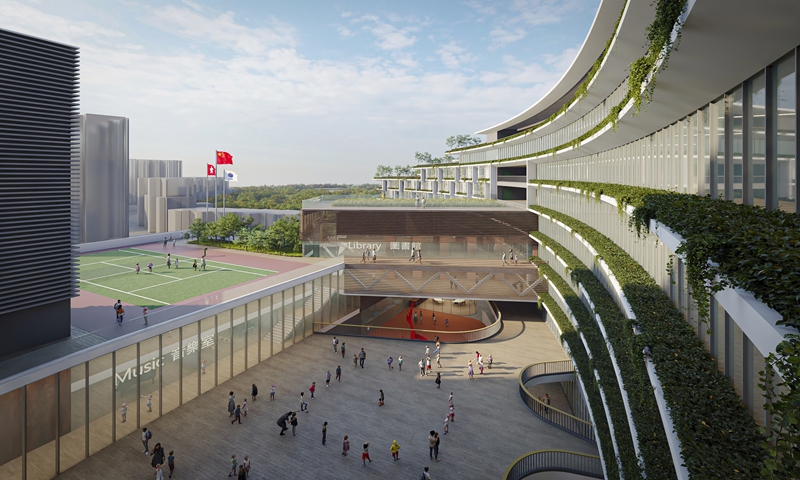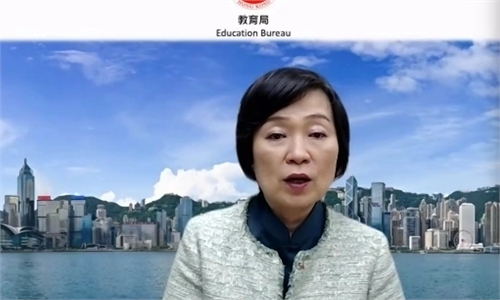HK’s first mainland-curriculum school to help deepen understanding of Chinese values and cultivate global vision

Design picture of Yew Wah School of Hong Kong Photo: Courtesy of Yew Chung Yew Wah Education Network
Hong Kong's first school that offers a Chinese mainland curriculum will start operation as early as the 2026-27 school year, the Global Times learned. Yew Wah School of Hong Kong plans to offer 12 years of primary and secondary mainland curriculum education, ensuring students have a deep understanding of Chinese history, culture and values while cultivating their global vision and bilingualism in Chinese and English.Located in Tin Shui Wai, the school is about 20 minutes of drive from the neighboring city Shenzhen, South China's Guangdong Province, which provides more choices for families from the mainland to Hong Kong for work or investment, Troy Lui, chief education officer of Yew Chung Yew Wah Education, told the Global Times in an exclusive interview.
The Education Bureau of the Hong Kong Special Administrative Region (HKSAR) has allocated a greenfield site next to the Hong Kong Wetland Park for the Yew Chung Yew Wah Education Network to establish a non-profit-making private school offering mainland curriculum, and the school is expected to welcome its first batch of students in 2026 and will provide 900 school places.
From the first to three years of the establishment of the school, it will offer primary and secondary curriculum, and from the four to six years, it will offer senior secondary curriculum and from seven to 10 years, the school is expected to offer curriculum covering 12 years of primary and secondary mainland curriculum education, Lui told the Global Times.
"Our goal is to become an excellent school for racticing the mainland curriculum, and the school will also set up an internal review mechanism, taking reference from the mainland education authorities' annual inspection standards and international school certificate standards," he said.
The chief education officer said that 900 school places in the initial stage will meet the current and future demand for mainland curriculum. The school, which mainly recruits mainland students from Hong Kong, will also serve Hong Kong local students who intend to study on the mainland.
With the integrated development of the Guangdong-Hong Kong-Macao Greater Bay Area and Hong Kong attraction to mainland talent, the demand from mainland families in Hong Kong for mainland curriculum will increase, according to local media reports.
The school's mainland curriculum with elements of international curriculum implemented will help students, no matter which stage of study they are in, can seamlessly integrate with mainland courses, Lui said.
"On the other hand, it also allows students to have sufficient advantages in terms of bilingual, academic abilities and learning methods whether they choose mainland or oversea universities."
Hong Kong's education sector has seen a number of positive changes over the past few years since the implementation of the National Security Law for Hong Kong and the electoral reform, which helped bring back the social order and fix the loopholes in local governance.
Courses in Yew Wah School of Hong Kong will be taught in Putonghua and English, not in Cantonese. The school has been promoting "bilingual and multicultural education" for many years.
In Hong Kong, it is even biliterate and trilingual. Students in Yew Chung International School of Hong Kong - under the Yew Chung Yew Wah Education Network - can speak Cantonese, Putonghua and English.
"If mainland students come to Yew Wah School of Hong Kong in the future, they should inherit the existing tradition and be encouraged to develop the three spoken languages," Lui said.
As the first school in Hong Kong to offer a mainland curriculum, Yew Wah School of Hong Kong has responded to the real needs of "Hong Kong drifters."
For a long time, due to the different educational systems and examination content between Hong Kong and the mainland, "Hong Kong drifters" have faced practical problems such as their children's schooling while working in Hong Kong. Hong Kong drifters refer to people mostly hailing from the mainland who come to the city hoping to change their life for the better.
Many mainland talents who have obtained permanent residence status in Hong Kong also express the willingness to let their children study in mainland courses, the Global Times learned.


